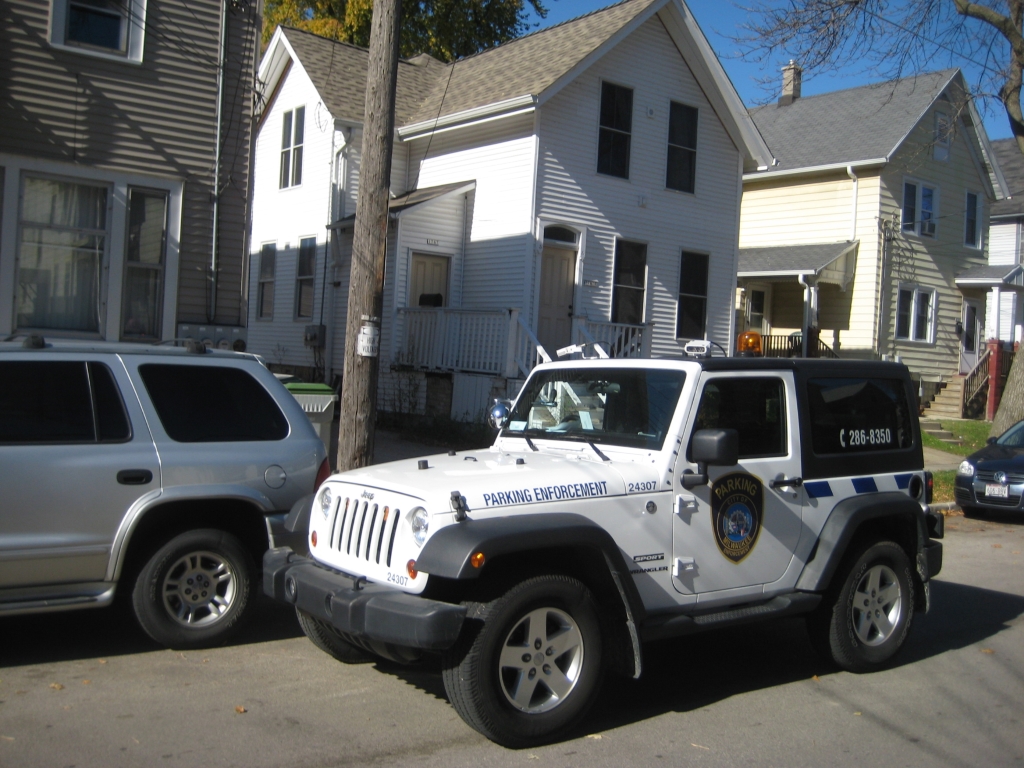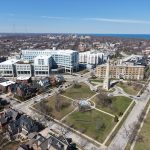Milwaukee To Issue More Parking Tickets at Higher Prices in 2025
Strategy part of effort to fund other city services, improve parking access. But is it a stealth way to fund The Hop?
The Department of Public Works (DPW) intends to boost the city’s bottom line in 2025 by issuing more citations, increasing citation costs and extending meter hours.
It’s a move that is years overdue if the city wishes to continue to use its transportation fund as a revenue source to fund other departments. The 2025 budget calls for harvesting $6 million for the general fund. The fund’s fiscal health has eroded since COVID-19 decimated the city’s parking revenue and the city continued to withdraw money.
A big chunk of the 2025 revenue increase will come from issuing more citations. After issuing 463,098 citations in 2023 and budgeting to issue 455,000 in 2024, the city expects to issue 500,000 next year.
Department of Public Works officials believe they’ll hit that mark not by creating new violations, but by finding violators currently being missed.
“Our hope and our goal is that in 2025 we will be fully staffed with parking enforcement officers,” said Department of Public Works parking services manager Thomas Woznick to the Finance & Personnel Committee on Oct. 10. He said the department has been short 10 to 15 members in recent years, but has recently closed the gap. The city has increased pay rates, switched to mailing some tickets to avoid confrontations and opened a continuous recruiting process.
The average cost of a citation will increase by $12. The city has not hiked most of its citation costs since 2009, since which it says there has been a 43% rate of inflation. The number of vehicles towed and night parking permits sold is expected to remain steady in 2025.
Increasing the cost of citations is expected to bring in an extra $2.5 million in revenue. However, the city expects to only see a $2 million net increase, boosting its annual collection to $17 million.
“Revenue is trending pretty low this year on parking citations,” said budget analyst Sarah Osborn. Without increasing the citation costs, she said the city would need to budget for $500,000 less in 2025.
Council members raised concerns about the impact the overall strategy. One member raised concerns that the public would see it as a way to fund the streetcar.
“These are people that are actually breaking the law,” said Public Works Commissioner Jerrel Kruschke, citing safety concerns of illegal parking. He said the city hoped to also see people choose alternative transportation options to get to busy areas like Downtown.
“Has there been an equity analysis?” asked Alderwoman Marina Dimitrijevic. “Are there any unintended consequences?”
“Parking is there for access and turnover,” said Kruschke. “We want someone to park there, do their business and kind of move on.”
But Dimitrijevic asked about people who would need to park for more than two hours.
“One of the things we don’t emphasize enough is the amount of available parking that downtown has separate from street parking,” said Kruschke.
“50,000 spots downtown, 5,000 of them are street [parking spots],” interjected budget director Nik Kovac, who previously led walking tours about the design of parking structures.
“I would rather utilize right-of-way for other uses,” said Kruschke. Several pending street reconfiguration projects would reduce driving or parking space for wider sidewalks, protected bike lanes or plazas.
Woznick, speaking of equity concerns, said the city does not use its authority to suspend driver’s license renewals for nonpayment of citations, nor are the citations criminal charges.
Are Parking Tickets Funding The Hop?
There are also questions about who is paying the tickets, and what the money gets spent on. While the money going into the general fund has no direct link, operation of the city’s streetcar system, The Hop, is included in the transportation fund.
Ald. Scott Spiker, a vocal streetcar skeptic, said the city was opening itself to an attack that it is charging poor people to operate a streetcar used by rich people and asked for hard data.
“Is it the Gold Coast that’s paying these fines, or is it all over the city?” asked the alderman. He said he wanted to see a map of who is paying the citations and where the citations are being issued. “I have a feeling those dots don’t line up.”
“We have not done that type of analysis before,” said Woznick of who is receiving citations.
But there is data on where they’re being issued. It primarily includes areas in and around Downtown. Osborn said 11% of night-parking violations are issued in the third district, which includes the East Side, Riverwest and the northern edge of Downtown, with the remainder being spread evenly across the city’s 14 other districts. More than 50% of safety violations are issued in districts three, four and 12, which include Downtown, Riverwest, the East Side, the Near West Side and Walker’s Point. Most of the city’s 6,200 meters are located Downtown.
The Hop is budgeted to cost $5.1 million to operate in 2025, which is to partially offset by $1.7 million in sponsorships and federal operating grants.
“That means there is a $4 million transfer to the general fund that’s not happening as long as we’re running the streetcar,” said Spiker. He raised the specter of fareboxes. The Hop is currently free to ride.
“As it stands right now, if we put the fareboxes in, we would be breaking even or possibly even losing money,” said Kruschke of the cost to install and enforce a fare system. He said other cities have seen more utility from their systems by maintaining them as free. Cincinnati, which has a system similar to Milwaukee’s, saw record ridership after removing its fare in 2020, and now exceeds pre-pandemic numbers.
Milwaukee has yet to return to pre-pandemic totals, though it is trending upward. Streetcar ridership, tracked by automatic counters in the vehicle doors, is up approximately 8% year-over-year to 1,516 riders per day. This is the first full year with the L Line lakefront extension, which saw ridership surges during lakefront festivals.
“It will not be, in the foreseeable future, a revenue gainer,” said Spiker.
But the system’s then-manager noted it wasn’t just used by the rich, as Spiker suggested.
“About 50% of our riders are below the $50,000 [income] threshold,” said streetcar services manager Andrew Davis-Lockward, citing a Southeastern Wisconsin Regional Planning Commission rider survey. Davis-Lockward, as revealed at an Oct. 23 Public Works Committee meeting, is no longer employed by the city.
The city is moving to attempt to save money on The Hop’s operating costs. The budget proposes bringing a key marketing role in-house. A $350,000 marketing contract with 2-Story will be replaced with a new DPW job at an estimated annual savings of $219,000. The marketing position will not only be responsible for the promotion of the system, but also for working to solicit private sponsors. Kohl’s, Harley-Davidson, Everstream and several other companies have purchased vehicle wraps in recent years. Kruschke promised a “larger effort that we’ve put forward before” on securing sponsorships, though the budget calls for only $50,000 in revenue outside of the Potawatomi Hotel & Casino title sponsorship.
Ald. Peter Burgelis asked what has happened to property values along the line.
“They have gone up significantly, in the billion-dollar range,” said Kruschke. He also cited two development projects, one of which received public funding to have a streetcar station in its base. “The 333 building just went up along Water Street. They specifically wanted to be right on the actual streetcar tracks, so it has sparked development as well, The Couture also,” said Kruschke.
Burgelis proffered that the increased property tax revenue might be covering the cost of operating The Hop.
“Well, I would like to see that analysis,” said Spiker. “It might be true, but it’s going to require an economic analysis far beyond DPW.”
Kurschke said the city continues to explore how to extend The Hop, despite the restrictions imposed by Act 12. “We are working on a plan,” he said.
Extending Meter Hours
A previously approved policy change is also about to be implemented, said Kruschke.
The council, in March 2023, authorized extending the period in which meters were in effect from 6 p.m. to 9 p.m. and putting more meters into effect on Saturdays. But Kruschke told the committee that the city didn’t want to surprise anyone, so it has been working with impacted business improvement districts on a roll out strategy. “We will be starting to do that before the year end,” said Kruschke. He said citation increases would also factor into the policy’s success.
“We’ve found out that in some areas of the city where parking is tough to find, people are taking a risk of getting a ticket because it’s cheaper than getting a citation,” said the commissioner. The city already enforces extended meter times and higher rates in 212 spaces around Fiserv Forum. The maximum rate is $5 per hour.
DPW has never implemented its full, market-based strategy from 2018 that would raise rates in certain areas and lower them in other areas based on usage.
It also isn’t pushing for meters to be in place on Sundays, when it currently has reduced staffing. “It looks like we could gain $200,000 to $300,000, but then the back end costs, there is zero gain overall,” said Kruschke. Woznick said it would require two shifts of employees.
The city, which previously withdrew more than $10 million annually from the transportation fund, needs its parking strategy to work, or it will have to cut elsewhere. The 2024 budget, bolstered by use-it-or-lose-it federal aid, included no general fund transfer. But, according to a budget slide, the city’s internal accounting still reflects that there is an approximately $40 million negative balance in unrestricted money in the fund.
The fund’s unrestricted balance went negative in 2018, but exploded downward in 2020 when the COVID-19 pandemic hit and the city suspended most parking regulations. In the ensuing years, faced with a looming fiscal cliff, the city continued to withdraw more money than it was generating. “We want to make more conservative assumptions about revenue to allow the transportation fund to restore itself to health,” said Osborn.
Beyond issuing more tickets, the vehicles from which the citations are issued will look different next year. Backed by a $1.68 million federal Congestion Mitigation and Air Quality program grant, the city will begin transitioning its parking vehicles to a fully electric vehicle fleet. The project is estimated to cost $2.1 million and could last until 2030.
The proposal is subject to Common Council approval as part of the 2025 budget.
Legislation Link - Urban Milwaukee members see direct links to legislation mentioned in this article. Join today
If you think stories like this are important, become a member of Urban Milwaukee and help support real, independent journalism. Plus you get some cool added benefits.
More about the 2025 City of Milwaukee budget
- Milwaukee Creates Economic Hardship Waiver For Keeping Chickens - Nick Rommel - Dec 27th, 2024
- What’s In The 18 Footnotes Added To Milwaukee’s Budget? - Jeramey Jannene - Dec 12th, 2024
- Council Rejects Mayor’s Vetoes, Finalizes 2025 Budget - Jeramey Jannene - Nov 26th, 2024
- City Hall: Mayor Johnson Issues Several Budget Vetoes - Jeramey Jannene - Nov 20th, 2024
- Milwaukee Fire Department Announces New Organizational Changes and Personnel Enhancements in Response to 2025 Budget - Ald. Peter Burgelis - Nov 18th, 2024
- Council Boosts Road Repair In Adopting 2025 Milwaukee Budget - Jeramey Jannene - Nov 8th, 2024
- Council adopts Ald. Burgelis Amendment to Address Decades-Long Underfunding of Local Roads - Ald. Peter Burgelis - Nov 8th, 2024
- Budget amendment adopted to bolster sworn personnel recruitment efforts - Ald. Peter Burgelis - Nov 8th, 2024
- Common Council adopts amended 2025 City budget - Ald. Marina Dimitrijevic - Nov 8th, 2024
- Alderwoman Coggs sponsors budget amendments aimed at improving services, supporting residents - Ald. Milele Coggs - Nov 8th, 2024
Read more about 2025 City of Milwaukee budget here
Political Contributions Tracker
Displaying political contributions between people mentioned in this story. Learn more.
City Hall
-
Council Blocked In Fight To Oversee Top City Officials
 Dec 16th, 2025 by Jeramey Jannene
Dec 16th, 2025 by Jeramey Jannene
-
Latest Effort to Adopt New Milwaukee Flag Going Nowhere
 Dec 3rd, 2025 by Jeramey Jannene
Dec 3rd, 2025 by Jeramey Jannene
-
After Deadly May Fire, Milwaukee Adds New Safety Requirements
 Dec 2nd, 2025 by Jeramey Jannene
Dec 2nd, 2025 by Jeramey Jannene























I do not object to raising the fees for most parking tickets. And I certainly believe that the cost of a moving violation(s) needs to increase. Fines and fees serve a couple of purposes…like deterring people from doing it in the first place, as well as to bring in revenue. But I do object to extending the parking meter hours at night and in the evening. For an area that has a lot of restaurants, it is nice to not have to plug the meter when you want people to come to areas like Downtown and not go to the suburbs. You want to encourage patrons to come there, instead of driving to the suburbs where there is free parking
How about more officers around schools during when students are arriving and leaving for the day? I’m sure they’ll make bank on every car speeding or that doesn’t yield to a pedestrian entering the crosswalk or standing at the edge waiting for drivers to follow the rules.
I think the effort should be focused on giving out tickets for excessive speeding and not reducing the charges once they go to court. This would be much more profitable and would make the city a safer place.